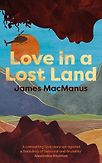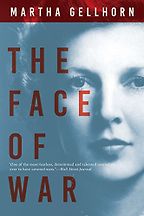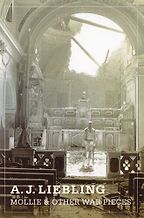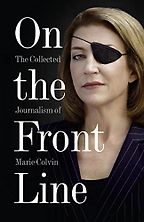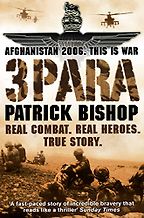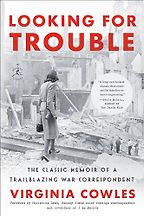You were The Guardian’s Africa correspondent for seven years and were also on the Telegraph’s diplomatic staff. Before we talk about the books you’ve chosen to recommend, I wonder if you would talk us through the role of the war correspondent.
Let me start my answer with a quote. One of the most famous war correspondents, A.J. Liebling—whose book we’ll be discussing later on—said that the one essential point of being a foreign correspondent was to be there. If you are a war correspondent, you have to be there, you have to witness what is happening on the front line. It’s an extremely difficult and dangerous thing to do.
Why should people do it? Readers are interested in the minutiae of war, because it’s only this that brings home the horror of what is actually happening. It is inevitable in warfare—particularly the kind of warfare we are seeing in the Middle East at the moment—that there are going to be atrocities. Those appalling horrors have to be witnessed as far as possible, because that is the only way that some sort of account can be taken, and justice done after the conflict is over.
So: war correspondents are the first witnesses of history. That’s the importance of their role.
We’re an English-language publication, so our recommendations tend to favour writers from the Anglophone world. But increasingly local journalists are coming to the fore in the international coverage of conflicts—thanks, in part, to the open platform of social media.
Any foreign correspondent—wherever in the world, but especially in war zones—relies on local journalists as guides and interpreters. Increasingly these men and women have taken front line roles in conflicts around the world, working for news agencies, radio and TV stations and major newspapers.
As we are witnessing in the tragedy in Gaza, several local reporters and cameramen have paid the ultimate price for their courage in being where it matters—on a fast changing and unpredictable front line. Many more are still there risking everything to tell the truth.
“Readers are interested in the minutiae of war, because it’s only this that brings home the horror of what is actually happening”
This role is getting increasingly difficult. Journalists are losing their lives trying to tell a wider audience what is happening. It becomes extremely difficult when you are working within a fast-moving conflict, a violent situation in which, frankly, the rules of international warfare of international law do not seem to be being observed.
Not an easy job. In your recent writing life, you have drawn from your experiences to write a novel, Love in a Lost Land.
Yes. It draws deeply from my time as a foreign correspondent in Africa in the 1970s, particularly my time in what was then called Rhodesia. The war in Rhodesia has never found its historian and it is largely regarded—certainly here, in the UK—as a bit of an embarrassment. It was a short, savage war fought largely outside the view of the foreign correspondent, because it took place in the bush, out in that beautiful country.
The novel focuses on an interracial affair between a white writer for an American magazine and a black African teacher called Patience, in a country where racial segregation was the norm. It counterpoints this love affair with the war, which at some stages is in the background and sometimes is very much the foreground. People who were there at the time have applauded its authenticity in terms of describing the mood and atmosphere of what was a very doomed cause by a minority white population.
It also puts on the page some of the atrocities that were happening in the bush. By both sides, I should say. There were no moral saviours in this particular conflict, and rarely are there moral champions anywhere in war. But this is part-war story, part-love story. I think that’s why readers like it so much.
I think this idea of the moral no-man’s-land comes through very strongly in your book recommendations. Shall we talk about The Face of War by Martha Gellhorn? As you noted before we spoke: there has been no war correspondent who has covered more conflicts.
Gellhorn was absolutely extraordinary. She never, never stopped. She died at the age of 90, and for the last few years of her life she wasn’t well, but for about sixty years she was travelling the battlefields of Europe. She started at age 22—talked herself onto a boat to Europe from America. She wound up in Paris with absolutely no money, and she didn’t make it. This is perhaps the most extraordinary thing about her: she was sent back to America, then, after writing a couple of really well-received books about the Great Depression, she managed to talk her way back there as a war correspondent and arrived in Madrid at 1936.
She was already married to Ernest Hemingway; they met in America and went to Europe together. It’s interesting to note that the applause her reporting received in America really irritated Hemingway. He was, frankly, jealous of her growing fame. I think one of the most remarkable episodes in her career was when she was refused accreditation to cross with the troops into Normandy for the D-Day landings in 1944—the British authority refused all women accreditation—so she disguised herself as a Red Cross nurse, smuggled herself onto a hospital ship, and crossed the Channel with the troops. She was the only woman to set foot on the Normandy beaches that first day. Her account of that day, and indeed what followed, is just remarkable. You can’t begin to describe it.
If I can, I’d like to read one small extract from this book.
Please do.
This is during the Italian campaign, while she was with American troops. After battle, she describes what she saw in the field:
This field grew huge dead cattle. They lay with their legs pointing up, and their open eyes were milky and enormous, and the air stank of their swollen bodies. We could not tell what had killed them because we were driving too fast through a long tunnel of dust which was the road. Aside from the hideous dead animals everything looked lovely, with the Adriatic a flat turquoise blue and the sky a flat china blue and the neat green hilly country of the Marche ahead. The major drove as usual like mad. There was plenty of dust in Italy all the time, but when he drove a roaring surf of dust beat out behind us. We were going to have a look at the front before lunch.
What strikes me as wonderful about that is that she counterpoints the dead cattle in the field—we don’t see actual violence, but we don’t need to—with the glory of the sea and the sky and the scenery, before finally the “going to have a look at the front before lunch.” The casual idea that you could do that. And she did it, Martha Gellhorn. All the time. She wasn’t afraid. It was extraordinary that she went through so many different conflicts without a wound.
It’s this combination of personal bravery and literary quality that sets Gellhorn—and the other war correspondents in your list, apart.
She wrote beautifully. I can’t recommend The Face of War, which takes in all her war reporting, enough. It’s still in print, and it’s just an amazing read.
You mentioned A.J. Liebling earlier. Could you tell us more about the book you’d like to recommend: Mollie and Other War Pieces. It’s available second-hand as a standalone book, or as part of a newer collection of Liebling’s war writing from the Library of America.
A.J. Liebling is my favourite of all the American writers who covered the Second World War. He died in 1963 and is forgotten now, but he was an extraordinary jewel in The New Yorker’s crown.
He had many passions in life. Boxing was one, and he wrote a great book on boxing called The Sweet Science. He loved his food, he loved France. The combination of those gave him another book, Between Meals. But the book I’ve picked here will always stay with me, Mollie and Other War Pieces.
Mollie was an American GI—short for ‘Molotov,’ a nickname from his combat troops because he was very pro-Russia, which was at that time an ally of the United States in the war. Liebling came across Mollie when he was with the Second Batallion of the 60th Infantry in the North African campaign against both the Italians and the Germans; he heard talk of this extraordinary soldier who always went out front alone, who had captured 600 Italians in a single action on his own, and who was regarded as an almost mythical figure by his fellow troops.
He only caught up with Mollie when Mollie had finally been killed after another amazingly suicidal action. Liebling began to dig into the background of this soldier and discovered that he’d been a barman in the Village, he was really called Karl Warner, and that he was simply a poor kid who’d assumed this identity in the North African campaign. He wore outrageous clothes, was court martialled twenty times when he was behind the lines, but when he was at the front, his officers let him do what he wanted to do, because what he was, was a great leader—he led troops into battle—and this is what caught Liebling’s interest. He writes absolutely beautifully. Here’s a paragraph from the beginning of the foreword:
I know that it is socially acceptable to write about war as an unmitigated horror, but subjectively at least, it was not true, and you can feel its pull on men’s memories at the maudlin reunions of war divisions. They mourn for their dead, but also for war.
That tells you something about the human condition—or particularly the male condition, let’s make that clear—there is a sort of DNA that inspires men to go to war.
Yes. It’s not something I feel the pull of myself. I find it interesting that he zeroes in on one extraordinary individual. I suppose that’s the challenge of war writing—how one can humanise the essentially inhumane political and strategic forces at play.
As I said at the beginning, reporters like this have to say what they see. They have to get as close as possible to the tanks, the snipers, the fallen dead and the screaming wounded. That is absolutely part of their job. But also they must try to humanise that for their readers, to reach out for particular characters.
Can we talk about Marie Colvin next? Because I think she really illustrates this point.
Please. This is On the Front Line: The Collected Journalism of Marie Colvin. It was published shortly after her death in 2012.
She’s the only one of the writers we are talking about today who actually died in conflict. She died in the Syrian town of Homs at 57 years old. She, more than most, was prone to take huge risks to get to the front—much more than, perhaps, she should have done. Indeed, I and many of her friends urged her to be more careful.
Here’s a little paragraph from the collection of her reporting, entitled ‘Jenin: The Bloody Truth.’ Jenin was and remains a refugee camp in the north of Israel on the border with Lebanon. The year was 2002 and there had just been a horrific suicide bomb attack, which had killed 28 Israelis in a Mediterranean resort town. The IDF went into the Jenin refugee camp, and pretty much what is happening now in Gaza happened then. So it’s sad to see that not much has changed since 2002. Here’s her opening paragraph.
The first medical teams allowed into the Jenin refugee camp last week followed the chickens. Human senses were overwhelmed by the devastation and the stench of death, but the birds were not distracted. They were hungry. Two rusty-coloured fowl pecking away at a bundle in the street drew a Red Cross team to the remains of Jamal Sabagh.
He was being eaten by the chickens. You could almost stop the story there. It tells you everything: the horror of chickens eaten corpses, the stench of death, the Red Cross… extraordinary reporting. One of the themes of this particular episode is that she finds nothing to console or give comfort to the propogandists of either side, as she establishes that within the Jenin refugee camp, suicide bombers had been trained and armed and told where to go. In other words, Hamas was then using the refugees as a sort of shield, a cover for their activities. And the IDF was certainly vicious and brutal in the way it smashed through buildings and all the rest. Many people died. But with 28 of their own having been killed in a suicide attack, you see the reason for their revenge—their savagery, if you like. And that’s why Marie Colvin finds the balance between the two. And it’s a very difficult balance to make.
I was working at The Sunday Times at the time of her death, and I remember the newspaper received a certain amount of criticism—there was a lot of discussion in the media about the ‘duty of care’ that an employer has for its employees. But it is a complex issue when it comes to war correspondents, for whom risk-taking is not only part of the job but also often—particularly in the case of Colvin—how they have made their name.
Good point. She was always being told, all the time, by her friends and indeed her editors, to be more careful. She had lost an eye in Sri Lanka during conflict, when she got far too close to the shooting. And she did so time and time again in the Middle East; it was a particularly violent time in Syria.
She was murdered there; one should be clear about that. A New York judge made that point. The Syrian artillery deliberately targeted the building she was in, knowing that she was there, and knowing that her reports would be highly critical of what they were doing in Homs. But that doesn’t mean to say that a correspondent taking slightly more care would have gone into that building, which she did.
It’s an almost impossible situation for a foreign editor. Telling a war correspondent to be careful? It’s just not part of the job. You can’t be too careful if you are covering a war. Obviously the risks that Marie Colvin took went beyond what most correspondents would do, that’s fair to say. And of course she shouldn’t have done it—because we’ve lost an amazing writer, an amazing colleague, and an amazing woman.
Thank you for those reflections. Perhaps we should talk about the fourth war correspondent’s book that you’ve chosen to recommend. Initially you were going to recommend Fighter Boys by Patrick Bishop, but you’ve decided to switch to his more recent book, 3 Para.
That’s right. Fighter Boys is a wonderful account of the Battle of Britain, with a huge amount of detail. But Patrick wasn’t there—and, as I said at the beginning, the point of a war correspondent is that he has to be there.
Now Patrick was there in Afghanistan in 2006 with the Third Parachute Battle Group, a British Army regiment, at the start of the UK deployment into Helmand Province. Apparently the paratroopers did so with a mission to bring schools and hospitals back to work, to ensure proper food supplies, and so forth. It was a psychological campaign, not a military campaign.
“Telling a war correspondent to be careful? It’s just not part of the job”
The point of the paratroopers is that they are the best trained in actual combat in the British Army, thus they were put in a position that they had to do something they weren’t really trained to do. But they did their best and Patrick was with them as they built the schools, repaired the roads and the waterworks, and so on and so forth.
But what they quickly found was that they were meeting a people who did not want them to be there. So this supposedly humanist campaign quickly became an actual, vastly bloody war in which the paratroopers were badly outnumbered and lacked the proper equipment. There just weren’t enough helicopters. So a peace mission became a war mission and the paratroopers were trapped in these mud-walled villages, were trapped in the desert without the proper armoured vehicles, not knowing where to go or how to fight this enemy that was there one minute and gone the next. It was a classic guerrilla war, and they lost a lot of men.
What Patrick Bishop has done is report on that mission step by step, reporting on how it became a nightmare for a very hardened and very famous British Army unit.
I suppose the main challenge of war writing must be how to transport the reader, safe at home in Britain or America or wherever they might be, into positions of desperation like these. Is it hard to retain the image of this audience at home while you yourself are reporting from a foreign location?
Good question. When I was covering conflicts in Africa and the Middle East, that’s one thing I held in my mind: there is a reader at home. In those days, it was print newspapers, and I had to make sure he didn’t just turn the page. I couldn’t just write: oh, a terrible atrocity happened and the Rhodesian forces blamed the guerrillas and the guerrillas blamed the Rhodesian forces. That isn’t going to work. What you have to do is talk to the people who are emotionally engaged.
I went into the townships around the Rhodesian capital, which was then called Salisbury, and talked to the people who were acting as guerrillas, or reporting back to the guerrilla bases in Mozambique about the morale of the white population. To break that morale, the guerrillas—then under Robert Mugabe—were killing as many white farmers as they could in the countryside, ambushing mission stations, making the roads impassible. Only by talking to, say, a barman in a township, could one get some idea of the frustration and the feeling of sheer oppression visited on them by the white minority.
It wasn’t all black and white. I should say this. Because many Africans joined the Rhodesian Armed Forces, both the regular military and special forces, and the police. So that made it more difficult to make moral judgements on the war. And moral jeopardy is something that foreign correspondents, and particularly war correspondents, find themselves caught up in if they try to make judgements as to who is right and who is wrong. As far as possible I tried not to make those judgements, I just tried to report what was happening. And I did so through the eyes and the ears and of the local people, the ordinary people I found there.
I’ll move us on to the final book on your list. This is Looking for Trouble by Virginia Cowles. It’s a memoir of the American war correspondent. Why do you recommend it particularly?
Cowles is a bit of a forgotten author now, but I think she was one of the greatest of the American journalists to emerge from World War Two. She was first a gossip columnist, a fairly high-born lady in Boston, writing society gossip for Hurst Newspapers. But she managed to convince her editor to send her to Spain to cover the Civil War. It was 1927, and she was 27 years old. She arrived in Madrid wearing high heels and a fur coat. There she met Hemingway and all the other correspondents, and of course things changed very fast. She saw the villages burning in Spain, was there when Madrid was shelled. Very quickly she understood that reporting of war was not a question of drinking nice cocktails in a bar and talking to the famous Hemingway. It was about getting down and dirty with ordinary people.
She followed the flames of that war across the map of Europe, to Poland, to the Arctic, to London for the Blitz. She was in Berlin when Hitler invaded Poland. I think her coverage from London in 1941, which is when her book was published, is one of the best accounts of what life was like in that city when the search lights where plunging up into the sky and the bombs were falling down, creating huge havoc. Here are the opening paragraphs:
There is a full moon shining down on London and overhead you can hear the drone of German bombers. The streets are deserted, but every now and then the stillness is broken by the wracking explosions of the guns.
On nights like this you wonder if future historians will be able to visualize the majesty of this mighty capital; to picture the strange beauty of the darkened buildings in the moonlight; the rustle of the wind and the sigh of bombs; the long white fingers of the searchlights and the moan of shells travelling towards the stars. Will they understand how violently people died: how calmly people lived?
Beautiful. It’s a wonderful book, and it’s still in print, by the way.
As I say, she was a high-born lady who stepped in and out of the grand hotels of Europe. She particularly liked Claridge’s and The Dorchester in London. She drank cocktails with the aristocracy here. But—and this is a huge but—if you read her book, you really understand what ordinary people felt, be it under the bombs in London, or in Paris as the city fell—she was in Paris as the Germans came, and only just escaped. A remarkable woman. This was her only book. She died in a terrible car crash in France.
Cowles and Colvin almost feel like fictional characters themselves. Their personal stories are remarkable. And I suppose you have found inspiration for your own novel in the war reporter’s lifestyle.
Absolutely. When I wrote Love in the Lost Land, it took me straight back to that time of my life. And it was very exciting. Africa in the 1970s was in ferment; the Portuguese empire had collapsed, Rhodesia was under attack from three sides, the whole South African regime was in play—as Kissinger realised. So it’s been a sort of time travel for me.
But I also desperately wanted to tell a story about a small era of history, which—as I said—has yet to find its historian. I hope my book gives people some sort of flavour of what was happening then. It was probably the most futile war I’ve ever covered.
Interview by Cal Flyn, Deputy Editor
February 14, 2024
Five Books aims to keep its book recommendations and interviews up to date. If you are the interviewee and would like to update your choice of books (or even just what you say about them) please email us at [email protected]
Five Books interviews are expensive to produce. If you've enjoyed this interview, please support us by donating a small amount.

